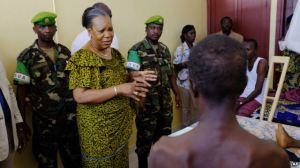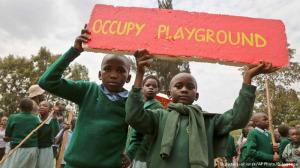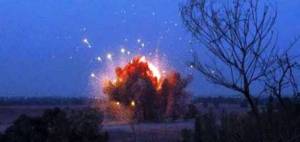By Ashley Repp
News Desk Reporter, Africa
Bangui- Central African Republic
For over a year, the Central African Republic has been in a state of turmoil, chaos, and religious conflict. In 2013, the Seleka group, a primarily Muslim militant organization, overthrew the government, and installed their choice of president, Djotodia. The country’s first Muslim president, Djotodia stepped down in January 2014 in response to international pressure. Djotodia was criticized for his inability to quell the violence and tension that had begun to spiral out of control in CAR in 2013. Crimes included widespread rape and murder. Compounding the issue, poverty was severe and widespread as well.

An interim government, with President Catherine Samba-Panza at the helm, stepped in an effort to attempt, once more, to ease the violence. Despite these efforts, the Seleka group and the anti-Balaka Christian group, have been struggling against one another, further thrusting the unstable CAR into crisis. As a result, significant and widespread murder, poverty, and instability have dominated the lives of many CAR citizens. Nearly a quarter of the population has fled in an effort to avoid the violence.
On Friday of last week, heads of both the Seleka group and the anti-Balaka group, met in Kenya to conduct a meeting on the possibility of a cease-fire. This appears to be one of the first sincere ceasefire agreements between the two groups. Previous peace talks have been low level and unsuccessful. Though the details of the engagement are currently unknown, the two groups drafted an ‘accord,’ which calls for a ceasefire between the warring factions that have led to thousands of lives lost.
Despite the efforts of these groups to agree to a ceasefire arrangement, the CAR official interim government refuses to acknowledge the validity of the agreement between the Seleka and the anti-Balaka. The government is refusing to acknowledge the accord, asserting that the agreement has no legal or functional basis, as it was agreed to and drafted outside of the scope of the official government and had not relationship to government peace talks and efforts. In fact, government officials have candidly expressed their opposition to the validity of this accord, contending that it is nothing more than an arrangement between two groups that have terrorized, and held hostage, the CAR since 2013.
For more information, please visit:
VOA- Central African Republic’s government rejects militias’ cease-fire accord– 29 Jan. 2015
Reuters- Central African Republic government says rejects ceasefire deal- 29 Jan. 2015
BBC News- Central African Republic factions announce ceasefire deal- 24 Jul, 2014
Daily Mail- Central African militias agree ceasefire days mediator– 28 Jan. 2015



